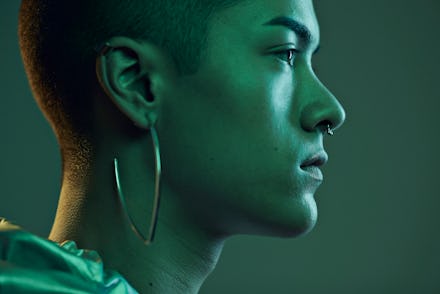What it means to be skoliosexual

The dating world can be challenging to navigate; its terrain is full of landmines. Some of them, like bros with dead animal trophies, can be avoided swiftly and easily. Just swipe left. Staying informed about the nuanced descriptors of gender expression and sexual orientation, however, can take a little more effort. Skoliosexuality is an identity that was new to me when I started dating again a few years ago, and its definition is a bit amorphous, so it’s worth examination from experts and insight from people within the community.
“Skoliosexuality means different things to different people,” says Laura Lee Townsend, a California-based clinical therapist. Most saliently, it refers to someone who is attracted to non-binary individuals — those who don't identify as only male or female, she tells Mic.
“For others, it's a way to express that they are attracted to anyone who isn't cisgender,” Townsend explains, referring to people who identify with the sex they were assigned at birth. “So it's often used to describe an attraction to trans men and women.” A skoliosexual could be attracted to someone with no binary gender affiliation or with a gender identity that is different than the one they were assigned.
To go even deeper, it could also mean that you’re attracted to people who play with gender norms, says Townsend. That leaves room for a lot of ambiguity in skoliosexuality, which could be the whole point. Other identity terms, such non-binary and trans, are also often used in fluid ways, sometimes with the explicit purpose of disrupting our attachment to easy gender definitions and roles. In other words, skoliosexuality could be about eschewing the hard-and-fast rules of the binary gender game.
It’s important to emphasize that there is a huge difference between being attracted to people with gender non-conforming identities and fetishizing trans people. “Being sexualized specifically for having a certain gender presentation feels a bit icky and inauthentic,” says Cy Ozgood, a gender fluid tarot reader in Milwaukee. “It feels like I'd have to stick with that to remain attractive, which isn't something I want to do. I'd rather know the people who are drawn to the part of me that stays constant while my gender is always changing.”
The good news is that not all of the non-binary individuals I spoke with felt fetishized, or at least not obviously so. “I don't feel like I've personally been fetishized because of my gender presentation but I do know a lot of my other gender non-conforming friends have been,” says Rae D'Agnillo, a PR account associate in San Francisco. They identify as a non-binary lesbian and is often attracted to other GNC folx. D'Agnillo expresses feeling validated, in fact, when people hit on them as a result of their non-binary gender presentation. “I feel more validated in my gender, if that makes sense,” they say.
This resonates with me as a woman who can present as androgynous. I often feel more comfortable with genderqueer or non-binary folks because maybe if they aren’t playing by strict gender rules, they will accept the ways that I’m not either.
Ultimately, because skoliosexuality could mean a lot of different things, says Townsend, the best way to understand the term and avoid objectifying or fetishizing is to ask the person who identifies as such what it means to them.